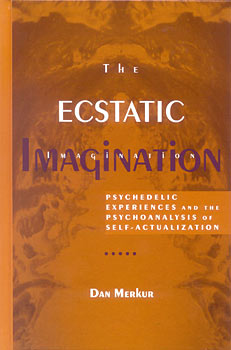
[an error occurred while processing this directive]
-- James Burnell Robinson, Univ of N. Iowa
"The book is well organized, clearly written, well researched, on a topic that is significant and interesting. The author reveals considerable insight into the subject matter."
-- Steven Katz, State Technical Institute at Memphis
BACK COVER #
The Ecstatic Imagination provides the first general theory of psychedelic experiences. Merkur refutes several theories that have been used to explain single categories of psychedelic experiences, and offers instead a unitary theory that is applicable to all varieties. The book treats self-reports of psychedelic experiences as a wealth of neglected data which forms the basis to expand the psychoanalytic model of human imagination. An exhaustive pehnomenology of the varieties of LSD, mescaline, and psilocybin experiences in Western and Native American cultures is joined together with psychoanalytic theories drawn from the classical, ego psychological, and object relations schools. Where existing theories prove inadequate to the discussion of data, original formulations are offered. The result is a rigorously psychoanalytic approach to the process of self-actualiation.BLURBS #
"The study of mysticism in the twentieth century has moved back and forth from those who posit a basic unity to the mystical experience to those who emphasize diversity. Those who favor the latter position have been somewhat in ascendance since the work of Steven Katz. but valuable as it is as a critique, Katz's position of seemingly irreducible diversity really does not have much positive to give us in understanding what the mystical experience may have to offer. Dan Merkur's typology is a real step forward in that he suggests that there may be a coherent overall pattern to heightened or altered states of consciousness. I am not saying that Merkur's work is "the last word" on the subject. Au contraire, it is the first word in what should prove to be a very fruitful line of inquiry."-- James Burnell Robinson, Univ of N. Iowa
"The book is well organized, clearly written, well researched, on a topic that is significant and interesting. The author reveals considerable insight into the subject matter."
-- Steven Katz, State Technical Institute at Memphis

